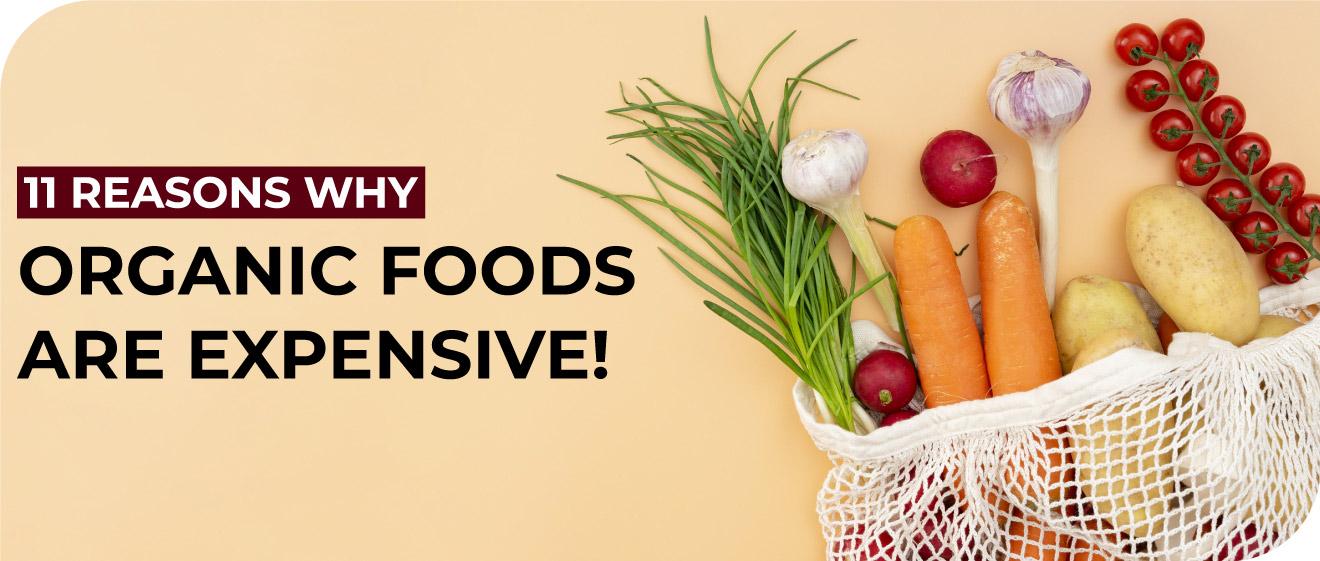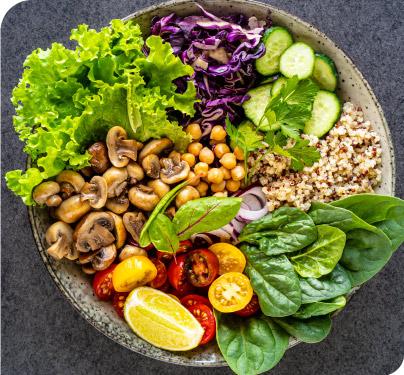11 Reasons Why Organic Foods Are Expensive!
The USDA National Organic Program (NOP) defines “organic” in the following manner:
Organic food is made by farmers who are committed to the utilization of renewable resources as well as conserving soil and water to improve the environmental quality for the future. Organic food is made with no conventional pesticides and fertilizers that are made from synthetic substances or bioengineering, sewage, or Ionizing radiation.
Before a product is declared “Organic” an approved government certifier must inspect the farm on which the food is produced to verify that the farm adheres to all rules required to comply with requisite organic standards. Did you now get why organic foods are expensive?

A study conducted in 1994 by researchers from the University of Wisconsin suggests that normal concentrations of Nitrate (a commonly used fertilizer) and a pesticide within groundwater can affect the endocrine, nervous and immune systems of infant babies and developing fetuses.
A study from 1973 links the high level of sodium nitrate found in groundwater with the incidence of gastric cancer. There was another study in 1996 linked to the incidence of testicular cancer.
Today, in a world where we are exposed to a huge amount of chemical toxins, air pollution, water pollution, and dangerous wastes, we tend to stay away from paying the additional costs that could be incurred many times over if we are afflicted by such dangerous illnesses.
Let’s attempt to tackle the most commonly requested question from consumers before diving into 11 reasons why organic foods are expensive.
What exactly is Organic Food?
Organic foods are food that is produced with no chemical or synthetic pesticides or fertilizers. Organic labels can be applied to everything from food items (where you’ll likely encounter it the most) to beans and grains and packaged snacks, as well as animal products.
In terms of dairy, meat as well as eggs, being organic implies that those animals are raised on organic farms and fed organic food, and were not treated with growth hormones or antibiotics. But food made from organic animals contains hormones since animals naturally produce hormones like humans.
Not to mention that animals on organic farms are exposed to the same unsanitary living conditions and killing practices as animals raised in traditional factory farms.
The alternative to organic food is known as “conventional” conventional food. The term “conventional” refers to any food item that does not limit the use of chemical and synthetic ingredients.
The presence of pesticides in trace amounts can be observed on a variety of common vegetables and fruits even after they have been washed.
Why Organic Foods are so Expensive!
There are a variety of reasons that could perhaps explain the question of why organic foods are so expensive. The biggest reason that deters people from buying organic is usually the cost that many shoppers can’t be able to justify.
Understandably, it’s difficult to decide to spend more money on organic produce and vegetables while their regular counterparts appear similar. Although it is easy to get caught up in this mindset, however, there are many (legit) reasons that organic foods are generally more expensive.
Curious? Find out some of the most important reasons why organic foods are expensive compared to conventional food alternatives.
Let’s attempt to understand some of the reasons why organic foods are more expensive than the traditional available options.
1. Organic Certification
Organic farmers must pay a substantial amount to be registered, accredited, and certified. These certifications are costly and time-consuming for a lot of handlers and growers. Not only are the initial certifications costly, but there is an additional cost associated with certification too.
Some of the most expensive certification expenses include the renewal of certificates, the education of growers, organic land, livestock that is of organic sources, organic seeds, and specific processing equipment.
Additionally, the cost of any chemical analysis is priced based on the results. If a farmer is cultivating two crop varieties on organic land, the fee will be increased. The majority of farmers are unable to pay for the expenses and the final price is higher. Hence, this is the first and the most important reason why organic foods are expensive.
2. More expensive cost of production
The costs of producing organic food tend to be higher due to the higher amount of labor required per output which becomes a crucial reason why organic foods are expensive. This is due to numerous aspects, such as the uncertainty of yields, the absence of growth hormones or growth enhancers as well as crop rotation on small scales, etc.
3. Price Increased for Shipping
When the crop is harvested, the handling of tiny quantities of organic food results in higher prices due to the requirement to separate organic and conventional crops, specifically to process and transport.
The cost of storage also goes up since organic crops have more risk of spoilage due to the non-use of chemical treatments that are applied in other ways. The entire process can increase costs at the point it gets to the market.
4. Education
To acquire organic farming expertise businesses invest an enormous amount of time and money to grasp the basics. Since the organic food policy is constantly evolving, staying current is essential, but it can also be cost-intensive.
Alongside self-education, organic business owners or firms must ensure that their employees adhere to the correct procedure. There are many different protocols and skill sets that are involved in the entire process of organic farming which must be adhered to for the operation to remain certified.
5. Demand-Supply Gap
The term “Economies of Scale” in terms of consumer goods means that the more you purchase in a given time, the more companies can produce, and the more you create, the lower costs will be. Demand and supply are significant issues in the food industry.
While organic food is growing in popularity every year, sales are not as high as in the conventional food market. If more consumers were buying organic products then there would be a greater demand, which would allow organic farms to grow.
This, in turn, could reduce costs. If consumers are swarming to cheap, harmful food items, they’re what corporations are looking to create. Hence, this factor of lack of economies of scale is a leading reason why organic foods are expensive.
6. Inefficient distribution and marketing
Marketing and distribution chains for organic foods are comparatively inefficient and prices are higher due to smaller amounts and a lack of awareness among consumers. Consumers who can afford healthier alternatives are drawn to conventional foods but are not aware of the negative effects they could cause over the long term. Because the market isn’t developed efficiently, the distribution channels are inefficient, granting power to the hands of a few and allowing them to charge premiums, which means more expensive prices for consumers.
7. Special Facilities
From processors to growers The majority of organic certified businesses require special land or facilities to produce organic food products. Organic land is more expensive than conventional land because it has an extensive list of characteristics that organic soil must be able to provide.
If an organic firm has space shared with conventional businesses more time must be spent ensuring that all products are not mixed or if they’re mixed, processing equipment is clean before they are used to process organic food.
8. No chemicals = more labor
Conventional farmers utilize the entire range of chemicals and synthetic pesticides since they can reduce production costs through the process of getting it done quicker and more efficiently. Without these, organic farmers would have to recruit more workers to do tasks like hand-weeding and cleanup of polluted water, as well as the removal of pesticides.
It is said that the Organic Farming Research Foundation explained it in detail: “The organic price tag better reflects the real price of preparing the food by replacing the labor and intensive management of chemicals that harm the environment and health cost of which is borne by the public.”
9. Crop rotation
Instead of employing chemical weed killers, organic farmers use precise crop rotations to ensure their soil is healthy and to stop the growth of weeds. After harvesting a crop organic farmers may utilize the area to plant “cover crops” which provide fertilizer to their soil to aid in the growth of future crops.
Conventional farmers, on the contrary, can utilize every acre for more profitable varieties. Because crop rotation can reduce the amount of time organic farmers can cultivate profitable crops, they’re not able to grow the greater quantity of crops that are the most economical for conventional farmers. This is therefore a reason why organic foods are expensive.
10. Post-harvest handling cost
To avoid cross-contamination, organic products must be kept separate from traditional food items after harvest. Conventional crops are transported in greater quantities because conventional farms can produce more. Organic crops are shipped and handled in smaller amounts since organic farms typically produce less, which means higher prices.
Organic farms are typically located further away from cities, which increases the cost of shipping.
11. Cost of covering loss that is greater
Conventional farmers utilize certain chemicals to limit the loss of crops. For instance, synthetic pesticides deter insects, while antibiotics ensure the well-being of livestock. Organic farmers don’t utilize these chemicals, their losses are greater which means the farmer is charged more and adds cost for the consumers.
In addition, with no chemicals or preservatives added to conventional food products, organic ones are less likely to last as long in storage and shelf time.
Summary
Consuming food that is not organic for an extended time frame is an inexcusable risk of developing deficiencies and anomalies.
Financially Organic Food is indeed more expensive than conventional ones. But, we have to decide whether the benefit to our well-being is worth the cost.
Hence, these were 11 reasons why organic foods are expensive as compared to traditional alternatives!

